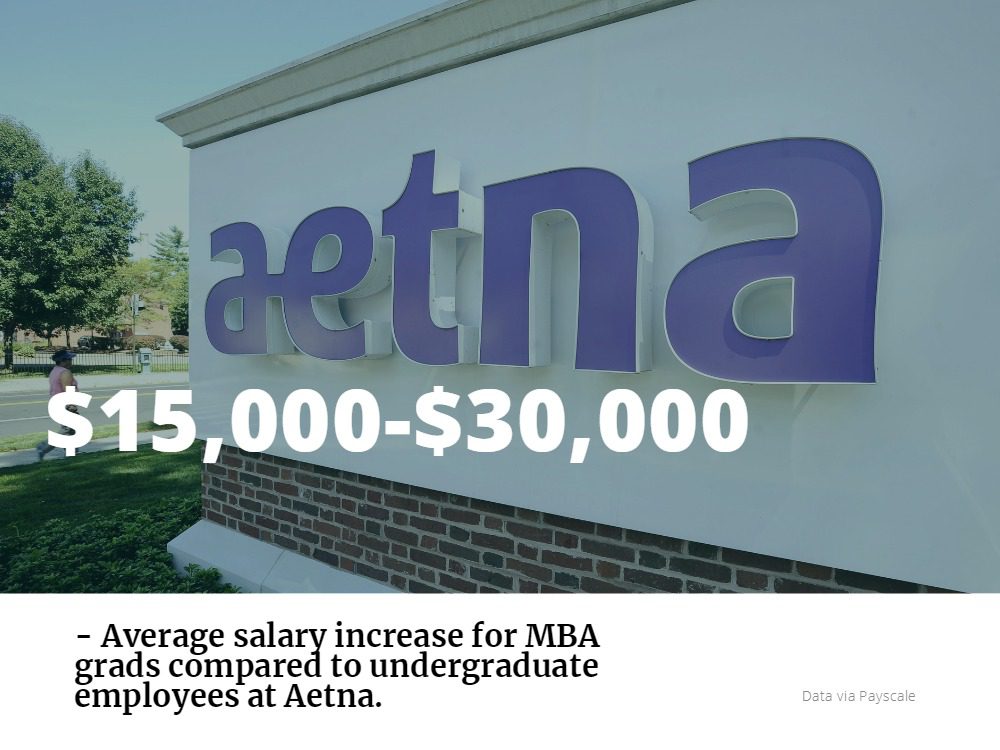Finding Your New Career: What MBAs Need to Know About Aetna

Founded in 1853, Aetna Inc. has long been one of the most successful health care companies in the world. Serving roughly 37 million consumers, Aetna makes it a priority to recruit diverse and dedicated individuals to their team of nearly 50,000 employees throughout the U.S. The company’s wide reach and impact on the world of health care cannot be overstated; last year, the company made headlines with the huge announcement that it would be purchased by CVS in a $69 billion acquisition—a move which one New York Times report said would “reshape the American health care industry.”
With a commitment to finding skilled team members, and with needs ranging from health care to technology to financial services, it’s no wonder that Aetna and MBAs can make a perfect pair. Aetna has a long history of MBA recruitment, offering a Summer Associate Program which was recently named in Vault‘s 2018 “Top Internship Survey” as the second “Best Healthcare Internship” and ninth “Best Financial Services Internship.”
Why MBAs Love Aetna
Even with massive growth and the status of Fortune 50, Aetna can hardly be described as a stuffy or overly bureaucratic workplace. And it’s no wonder with a mission to help people and build a healthier world that that work should start with their own employees. The recognition Aetna has received for their diverse workplace speaks for itself: in 2016, the Human Rights Campaign Foundation named the company among the best places to work for LGBT employees. Other awards include a 2015 “Best Employer Healthy Lifestyles Platinum Award” form the National Business Group on Health, as well ranking in Training magazine’s “Training Top 125” as the 60th best company for employee development.
MBAs may be drawn to a potential Aetna career for its focus on employee development and creating a diverse workforce, but they probably stay for the payday. According to Payscale, MBAs at Aetna can make anywhere from $84,000 to to $10,200, a significant increase from the average salary for those with undergraduate degrees (around $70,000).

In addition, Aetna’s benefits package truly reflects the company’s strive towards healthy lifestyles. In addition to healthcare, company benefits include coverage for services like counseling, legal and financial support, employee discounts, and access to fitness centers.
Life at Aetna
Aetna offers a number of early career opportunities for recent graduates, which focus on area-specific training and providing access to a network of mentors and experienced professionals. Interested students will find development programs in a wide range of fields, including:
- Actuarial
- Finance
- General Management
- Human Resources
- Information Technology Leadership
- Information Technology Technical Training
- Sales
- Underwriting
The details of each program vary from field to field, but typically span anywhere from three to six years. Most programs also include rotations that will allow students exposure to the wide variety of opportunities open at Aetna, even within a particular area. For example, possible rotations included in the Financial Development Leadership Program include business finance, investor relations, tax, and corporate investment. After the program is completed, graduates will be placed in a full-time position, though the professional development and advancement opportunities will continue long after the program is done.
Landing an Aetna Career
Aetna is an active recruiter of MBAs and interested students should keep an eye out for professional recruiting events and career fairs throughout the country.
Each Aetna career has different requirements, but most early career programs expect applicants to have a GPA of 3.0 or higher, an undergraduate degree in a related field, strong analytical and communication skills, and the ability to succeed in a fast-paced environment.
In addition to the early career program, at the time of writing, there are 16 open jobs that require or strongly prefer applicants with MBA degrees. Below is a small sampling of the types of jobs available to MBA graduates at Aetna:
Product Strategy Manager – New Insurance Plan Design
- The Product Strategy Manager, a position for which candidates with top tier MBA degrees are preferred, will be at the forefront of decisions surrounding what healthcare is and how/where/when its delivered to those in need. According to data reported to Payscale, individuals in this role earn an average salary of $123,000 each year.
National Accounts Product & Solutions Leader
- Requiring an MBA and at least eight years of professional experience, the National Accounts Product & Solutions Director will “execute the product and solution strategy for the company in the national account employer group market” through collaboration as a member of the Large Group Solutions team.
Lead Marketing Analytics Consultant
- The Lead Marketing Analytics Consultant will use statistical predictive models to problem solve and help make decisions. The person in this role will also serve as a key contact for business stakeholders, and must be able to easily convey their predictions and recommendations to senior leadership. For this role, Aetna seeks someone with at least 7 years total business experience with an MBA preferred.
What are the Highest Paying Finance Companies for MBAs?

Let’s face it: even if money isn’t the number one reason you are looking into an MBA, it’s probably pretty high on the list. We know that earning an MBA can not only lead to a raise in salary, but can open the door to even more career opportunities that can further increase your earning potential. For those with money on the mind, there’s a lot to consider when pursuing your MBA, from which specialization will give you the most ‘bang for your buck’ to what kind of future employers most value their MBAs.
One of the top industries that consistently makes the list when looking for the most valuable MBA specializations is finance. With an average salary of $121,000 USD for jobs within the finance industry, having or working towards your MBA is a reality of the field. But for those who are willing to put in the work, finance companies are willing to pay.
The 5 Best Paying Finance Companies For MBAs

One of the places where MBAs are earning top dollars is Morgan Stanley, a financial services firm that provides a number of financial advising services, such as wealth management, investment banking, sales and trading, research, and more. Morgan Stanley is an active recruiter of diverse business school and MBA graduates, with their most recent cohort of recruits coming from 56 different countries. The company offers graduates a number of different ways to get their foot in the door, including a number of summer internships and fellowships designed specifically for MBAs.
It’s clear that Morgan Stanley believes in investing in the MBAs on its staff. While the average salary at the company is in the $75,866 range for those with just a bachelor’s degree, employees have reported average salaries around $100,477 after earning an MBA.
Depending on the job and department within the company, earning potential can be even higher. Within the firm’s investment banking department, salaries can reach over $200,000. One reason for Morgan Stanley’s high numbers come from their reputation to dole out tremendous bonuses, which—combined with the base salary—makes this company one of the highest paying firms for MBAs in finance.

Godman Sachs Group, Inc., a multinational finance company that focuses in global investment banking, investment management, securities, and a number of financial services. Founded in 1869, the company today has 34,000 employees throughout the world and revenue of more than $42 billion. Goldman Sachs makes a number of opportunities available to recent MBA graduates and current students, such as the Goldman Sachs MBA Fellowship which recognizes outstanding business students with a role as summer associate and $35,000 award in addition to the associate’s salary.
According to Payscale, MBA holders at Goldman Sachs earned a median salary of $96,844. With such a high number of diverse MBAs working for their organization, this average includes the salaries of finance managers, CFOs, financial analysts, financial controllers, and many other positions that MBAs might hold within the company.

Bank of America began more than a hundred years ago, undergoing a series of expansions and mergers that ultimately led the company to its role as one of the ‘Big Four’ banks of the United States. Today, Bank of America makes more than $87 billion in revenue and employees a whopping 208,000 employees throughout the world. Through campus recruiting, diversity fellowships, and summer internships, Bank of America actively seeks talented MBA students and recent graduates. Through the full time analyst and associate programs, graduates work full-time in a structured program that offers consistent training, development, and social opportunities.
Bank of America employees with MBA degrees report an average salary of $101,522. Programs dedicated to hiring and training MBAs, such as the Bank of America MBA Leadership Development Program, matches these exceptional salaries, offering recent graduates impressive professional development opportunities as well as salaries ranging from $94,918-$101,733.

Headquartered in Zürich, Credit Suisse Group is a multinational financial services holding company with a heavy presence in the United States. With more than 48,000 employees worldwide, Credit Suisse in 2014, was said to hold more than $888 billion of assets under management. Credit Suisse offers several pathways for MBA graduates to become involved at their company, offering positions as full-time analysts, associates, and career starters.
Depending on the role, there can be a wide range of salaries recent graduates might earn when they join Credit Suisse in an analyst positions. Positions like investment banking analyst or business analyst are likely to make upwards of $70,000-80,000, with the opportunity to turn your degree into much more as you move up through the ranks. The average salary for an MBA with a finance specialization, according to Payscale, is $120,414.

Barclays, a British multinational bank and financial services company, is well-known today for its global reach, employing more than 120,000 people and operating in more than 40 countries. Like the other high-paying financial firms on this list, Barclays offers a number of opportunities to draw talented MBA graduates to their company. Programs like Barclays MBA Ambition gives MBA candidates the chance to get a summer internship at the company even before beginning their program, allowing them to focus fully on school once it starts while feeling confident about the future. This fellowship, for example, offers $45,000 toward first-year tuition with the opportunity for an additional $45,000 in their second year if they choose to join Barclays full-time after graduating. On average, salaries for recent graduates can range from $69,588-$74,898.
What MBAs Should Know About BMO Financial

BMO Financial Group, established in 1817 as Bank of Montreal, is one of the largest diversified financial service providers in North America. According to BMO, more than 45,000 employees serve the financial needs of more than 12 million customers. Continue reading…
So, What is a Strategy MBA and Where Can You Find One?

For those who don’t have a natural knack for strategic thinking, the ability to analyze effectively and make logical decisions can often seem like the kind of skill that just can’t be taught. Luckily, most business schools disagree.
Not only is strategic thinking a skill that can be studied and improved, but an advanced education in this field can lead to a wide array of careers, often incredibly lucrative ones. After all, the ability to make strategic decisions can lead to success in all aspects of business and across numerous industries- that might be why those who earn MBAs in Strategic Management are entrepreneurs, COOs, Department Supervisors, Business Analysts, and are found at any number of high-level management positions.
Whether you are born with the skill or not, pursuing a Strategy MBA is the perfect way to set yourself up for a versatile career in strategic management.
What is a Strategic Manager?
In an ever-changing and often tumultuous business world, an organization’s strategic planner can be a crucial part of their growth and continued success. A career in strategic management or planning will involve keeping an organization on course through the collection, analysis, and organization of information pertinent to the company’s profitability. This may include tracking industry trends, keeping an eye on external business competition or threats, identifying opportunities and creating action plans for a company based on strategic problem solving.
Strategy jobs typically deal in the “big picture” of the company, and are a key part of both shaping and supporting a company’s overall vision and values. The role is a desirable one within a company, as it provides direct access to senior managers and frequently leads to higher level leadership positions.
Strategy jobs require a candidate to use skills from a variety of disciplines, such as finance and marketing. Since these positions are often highly competitive and require candidates to demonstrate a high level of business acumen, earning an advanced degree in strategy is one of the best ways to prove you have the unique combination of skills and drive required for this often demanding—but incredibly rewarding—career.
What Is a Strategy MBA?
Given the breadth of skills required to be a successful Strategic Manager for a company, it’s easy to see why one would want an advanced degree in the field. An MBA specialization in Strategic Management is designed to provide students with a deep grounding within the logic of competitive advantage, focusing on both a broad understanding of business competition as well as a more nuanced training in analysis and decision making.
Offered at some of the top business schools throughout the globe, a Strategy MBA will help set future business leaders on course for careers in strategy consulting, general management, entrepreneurship, and a number of other careers that require the careful skills of analysis and problem solving gained with this degree.
Why Should I Get a Strategy MBA?
With the unique skill set required for a higher-level role in Strategic Management, earning an MBA with a specialization or major in Strategy can be crucial to proving your skill to potential employers. Regardless of your ultimate career goal, the “big picture” type of training offered by a Strategy MBA can be seen as shorthand for a person with the drive and acumen necessary to make crucial business decisions. And graduates with Strategy MBAs don’t always take jobs as Strategic Planners—they are CEOs, entrepreneurs, and other high-level leaders within their organizations.
Those who do earn Strategy MBAs are also often the highest earners among their MBA-holding peers. According to Payscale, Senior Strategy Manager positions can earn salaries of up to $119,000 per year, a large portion of which comes from bonuses, and occasionally, profit sharing. Graduates of Strategy MBA programs are employed at some of the world’s top companies, such as Deloitte, Amazon, and the Intel Corporation.

Where Can You Get a Strategy MBA?
With an increasing demand throughout the years for qualified and experienced strategy planners, a wide variety of business schools—including some of the top ranked MBA programs in the country—have begun to offer MBA specializations in the field of strategy management/planning.
Below are just a few of the MBA programs throughout the United States offering an MBA in Strategy or Strategic Management.
Temple University Fox School of Business
The Fox School of Business at Temple allows MBA students to focus their degree in Strategic Management, or earn a dual degree that combines an MBA with a Master in Innovation Management & Entrepreneurship (IME). The Department of Strategic Management (SGM) at Fox allows students to approach business strategy from four different angles- entrepreneurship, management, consulting, and international business. All for disciplines help prepare students to be leaders within the strategic management field through hands-on instruction, internship opportunities, networking events, travel abroad experiences, and more.
New York University Stern School of Business
The Stern School of Business at NYU allows MBA students to specialize their degree in Strategy, which will help provide a strong business foundation for the business leaders of tomorrow. The degree will help prepare students for a wide variety of fields, including careers in strategic planning, risk management, and management consulting. Courses in strategic management at Stern include: Competitive strategy in the marketplace, corporate governance, strategic design, strategic talent management, and more.
University of Pennsylvania Wharton School of Business
The world-renowned Wharton School at UPenn also offers students the opportunity to earn an MBA in Strategic Management, a major which aims to provide a “deep grounding in the basic logic of competitive advantage premised on a careful analytical treatment of the distinct qualities of positions of individual firms and an understanding of broader competitive dynamics.” Some of the courses offered as part of this major at Wharton include: Deals: the Economic Structure of Transacting and Contracting, Strategic Implementation, Multinational Business Strategy, Competitive Strategy and Industrial Structure, and more
How To Break Into the Tech Industry: Intuit Inc.

Since 1983, Intuit Inc.—the Mountain View, CA software company that spearheaded the creation of products like TurboTax, Quickbooks, and Mint—has effectively changed the way the average person manages their money. And with more and more MBAs shedding their finance industry aspirations for a role in tech, a job with one of the most well-regarded tech organizations is looking especially ideal.
Why Should I Join Intuit Inc.?
Intuit Inc. was ranked 13th overall on Fortune’s 2017 list of the “100 Best Companies to Work For,” and 30th overall on Glassdoor‘s newest “Best Places to Work” list. The company takes a holistic approach to ensuring company well-being. Intuit has 24-hour onsite gyms, and even provides a certain amount of bicycles for employees who bike to work. Fortune listed job perks like telecommuting, compressed work weeks, college tuition reimbursement, daily free time to pursue other projects, and paid time off for volunteering.

Many of the positions at Intuit are, unsurprisingly, tech-based, so an MBA may not be as advantageous in getting an engineering position. However, according to PayScale data, MBAs are typically the highest earners at Intuit, with the average MBA earning nearly $125,000 per year.
What Internships are Available?
Intuit Inc. has a specific internship for MBAs: the MBA Intern Marketing Manager position. This internship is offered in Intuit’s California locations in Mountain View and San Diego, as well as in Plano, Texas. In this position, MBAs help the company gain insight into the needs of customers and the effectiveness of current marketing strategies, through research and testing. According to the company website, these interns also have the opportunity to partner with teams working in, “Product Management, Development, Finance and Care.” This is a paid summer internship, so students can cover the cost of living while observing and contributing to innovations at a leading software company.
Intuit is currently offering a variety of other internship positions that might be appropriate for MBAs, such as a Marketing Intern position in London. MBAs specializing in Supply Chain Management can apply to be Supply Chain Specialist Interns, and work closely with Intuit’s Supply Chain Finance team.
At the company, it is not uncommon for intern’s to parlay their positions into full-time jobs after graduation. The company’s website says that its internship program, “is truly an ‘early identification’ program, focusing on identifying and investing in high potential university students really to encourage them in their early careers and potentially to bring their talent back to Intuit after graduation.”
How to Get Hired at Intuit
In recent years, Intuit has moved from a traditional interview process, to an innovative method of vetting candidates that incorporates virtual reality. Their hiring program, Assessing for Awesome (A4A), requires that candidates: “Speak for five minutes about themselves; speak for 15 minutes about two or three projects of which they’re proud; prepare a 15-minute presentation on a case study or coding exercise; participate in a 25-minute question and answer period.” The interview is conducted by an advanced staff member who works closely with the position in question. The company uses virtual reality to allow candidates to demonstrate their skill sets.
Intuit Inc. hires graduates and interns from a number of the top-rated business programs in the country, including the Northwestern University Kellogg School of Management in Chicago, Illinois, which brought in full-time employees and interns from the most recent graduating class. Some of the most highly-regarded MBA programs offer various tech industry advantages, including the recently introduced Tech MBA at NYU Stern, and the promising new Cornell Johnson Tech MBA, offered at the school’s new New York City campus.
For more information on which school’s provide the best opportunities to join the tech industry, head on over to our sister site Clear Admit, which recently took a look at programs from other established institutions like the UCLA Anderson School of Management and MIT Sloan.
Hot Jobs for MBAs: Becoming a Pricing Analyst

MBA graduates looking to apply their skills to a fast-growing and high-paying career may be interested in pursuing a role in Pricing Analysis. Named among the 100 best jobs in America by CNN, working as a Pricing Analyst is a perfect way for an MBA graduate to make use of their strong education combining skills in marketing, finance, and analytics.
With a predicted 10-year job growth of 41.2 percent and roughly 280,000 total jobs available, business students who think they might be interested this fast-growing career can start preparing while still in school through specialized study in marketing or finance. Armed with the special skills in data analysis in addition to the strong business background of an MBA, students looking to enter the field after graduation will have a competitive advantage as they begin their career.
We’ve rounded up the most important things to know about a career in Pricing Analysis to help you decide if it’s the right role for you.
What is a Pricing Analyst?
A company’s pricing analyst is responsible for figuring out the appropriate price for a business to place on a product or service. Using a variety of data and different metrics, the Pricing Analyst will determine the perfect price that will both appeal to consumers and produce an appropriate profit for the company.
Pricing Analysts must be able to track marketplace trends and implement a strategy that will benefit both the company and consumer. Someone in this role must be able to effectively communicate to a number of other departments such as supply chain, sales, marketing, finance, and be able to work with these groups in making pricing recommendations and decisions based on their analysis.
Pricing Analysts may be needed at wide variety of companies and organizations, ranging from construction companies, colleges and universities, banks and financial institutions, pharmaceutical companies, and more.
What Skills Does a Pricing Analyst Need?
Those who succeed in the role of Pricing Analyst typically have strong skills in mathematics, analytical thinking and problem solving. It is also important that Pricing Analysts are able to effectively communicate, as they are often required to explain their research and analysis to others in order to make important decisions.
Other skills employers may seek in a Pricing Analyst may be:
- An interest and skill working with numbers and data.
- Being a detail oriented and proactive worker.
- Have the ability to work with minimal supervision.
- Experience in back-office and billing systems and database management programs,
Pricing Analyst Salary
Pricing Analyst salaries, according to PayScale, may vary according to a number of factors, such as education, terms of the job, and type of employer. On average, Pricing Analysts can earn anywhere from $52,000-61,000 depending on their level of experience. In cities like New York and Boston, that number is slightly higher.
A recent study from Deloitte found even more impressive figures: 62 percent of respondents in a survey of pricing professionals reported salaries of greater than $100,000 and 83 percent of respondents said they were also eligible for an annual bonus.
EVEN MORE MBA JOBS: Verizon is on the Lookout for MBA Students and Grads
MBAs For Pricing Analysts
While most MBA programs do not offer a direct concentration in pricing analysis, a number of programs still provide specialized pricing education through other departments, like finance and business analytics. Below are just a few examples of pricing-related courses available at some of the top MBA programs in the country:
-
Scheller College of Business – Georgia Institute of Technology
The Scheller College of Business offers a course in pricing strategy as part of their Business Analytics MBA concentration. The course, marketing Analytics and Pricing Strategy, helps students gain skills in making effective pricing decisions through the understanding of important economic and analytical concepts associated with customer behavior and competition.
-
The Wharton School – University of Pennsylvania
FNCE717, or Financial Derivatives, at the Wharton School focuses students on making strategic corporate decisions, particularly when it comes to pricing. Students will learn several different approaches to pricing and how to apply such skills for investment and risk-management.
-
Rutgers School of Business, Newark and New Brunswick
The MBA program at Rutgers’ Newark and New Brunswick location offers a class in Supply Chain Pricing Strategy. The course recognizes the importance of pricing in driving profits and the extreme negative impact poor pricing decisions can have. Students will learn how to approach pricing from both a strategic and tactical level and be able to apply it to a number of fields and industries.
Do You Actually Need an MBA for the Job?
While an MBA is not necessarily a requirement of all Pricing Analyst jobs, it is by far the most common degree held by those in this role. According to the aforementioned Deloitte survey, 43 percent of respondents held MBA degrees, while just 26 percent—the next highest percentage—held undergraduate degrees in business. Earning an MBA and demonstrating specialized coursework in pricing will give those in the field a competitive edge and open the door to higher level management positions in the field.
